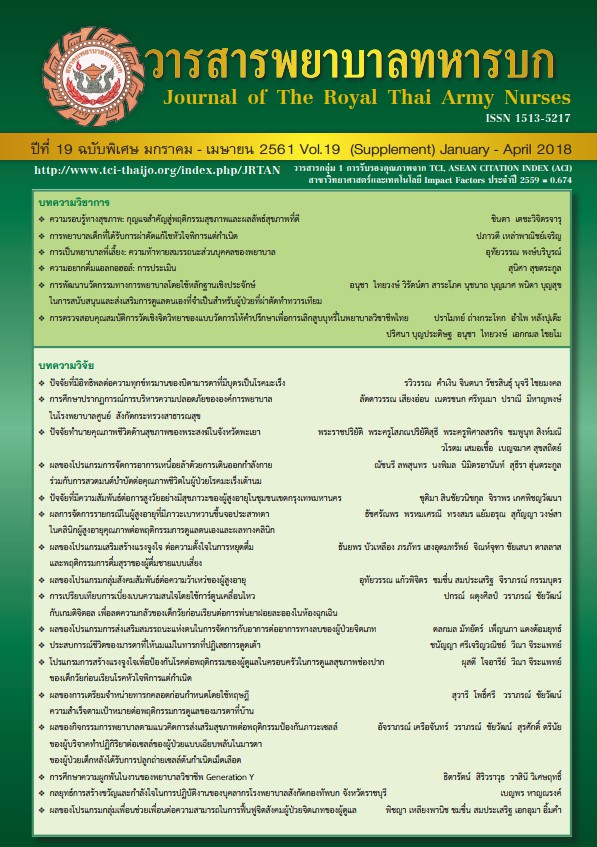Knowledge, Attitude, and Self Efficacy in End-Of-Life Care Of Senior Military Student Nurses
Keywords:
Knowledge, Attitude, Self Efficacy, Student Nurse, End Of Life CareAbstract
The purposes of this descriptive research were to describe knowledge, attitude, and self efficacy in end-of-life care of senior military student nurses, and to examine the relationships among those three variables. The 153 student nurses were recruited. All sample student nurses completed four questionnaires: one demographic experience care training program ethical questionnaire and three separated questionnaires of knowledge, attitude, and self efficacy in end-of-life care. Statistical analyses used were descriptive statistics and Pearson product-moment correlation coefficient. The results revealed that the average score of student nurses’ knowledge and self efficacy related to end of life care was at a moderate, while attitude score was quite high. There was a significant relationship between attitude and knowledge, attitude and self efficacy. However, there was no significant relationship between knowledge and self efficacy. The results provide the latest information for appropriate planning and educational guideline to enhance military student nurses competencies to provide quality of end of life care.
References
2. Pranee O. Role of Nurses toward Taking Care of Patients with the end of life based on Religious Beliefs. Journal of The Royal Thai Army Nurses. 2014; 15(2): 39-43. (in Thai).
3. Kozlov E. & Carpenter B. “What is Palliative Care?” Variability in Content of Palliative Care Informational Web Pages. American Journal of Hospice. 2015; 34(3): 241-247.
4. Pramoj Na Ayuthaya P., Monkong S., & Intarasombat P. The Effect of a Supportive Educational End-of-Life Care Program on Knowledge and Perceived Self-Efficacy of Professional Nurses. Ramathibodi Nursing Journal. 2011; 17(1): 141-156. (in Thai)
5. Jamjan L. & Chaleoykitti S. Trend of Palliative Care in the Bachelor of Nursing Science Curriculum. Journal of The Royal Thai Army Nurses. 2017; 18(1): 22-28. (in Thai)
6. Bloom B.S. Taxonomy of educational objectives: The classification of educational goals: Handbook: Cognitive domain. 1st ed. New York: Mc Kay. 1964.
7. Bandura A. Self-Efficacy: The Exercise of Control: 1st ed. New York: Freeman and Company. 1997.
8. Yamane T. Statistics: An introductory analysis 3rd ed. Tokyo: Harper. 1973.
9. Akarathanarak T., Kongsuwan W., & Matchim Y. New Registered Nurses’ Knowledge in Caring for Patients at the End of Life. Songklanagarind Journal of Nursing. 2014; 34(2): 103-116. (in Thai)
10. Arslan D., Akca N.K., Simsek N., & Zorba P. Student nurse’ attitudes toward dying patients in central Anatolia. International Journal of Nursing Knowledge. 2014; 25(3): 183-188.
11. Max E. & MacKenzie M.A. Just in KASE. Journal of Hospice and Palliative Nursing. 2017; 19(4): 356-362.
12. Ruansri P., Pothiban L. & Nanasilp P. Knowledge, Attitudes, and Practices Among Health Care Personnel Pertaining to Terminal Care for Older Patients with Chronic Illness. Nursing Journal. 2015; 42(2): 24-35. (in Thai)
13. Budkaew J. & Chumworathayi B. Knowledge and Attitudes toward Palliative Terminal Cancer Care among Thai Generalists. Asian Pacific journal of cancer prevention. 2013; 14(10): 6173-6180.
14. Elsaman S.E. Undergraduate Critical Care Nursing Students’ Knowledge And Attitudes Toward Caring Of Dying Patients. IOSR Journal of Nursing and Health Science. 2017; 06(1): 31-40.
15. Srisuwan N., Matchim Y. & Nilmanat K. Nurses’ Competency in Communication with Patients at the End of Life and Their Families and Related Factors. Songklanagarind Journal of Nursing. 2014; 34(3): 109-124. (in Thai)
16. Partiprajak S. Relationship between Knowledge, Perceived Self-efficacy in Basic Life Support (BLS) and Chest Compression Performance among Undergraduate Nursing Students. Songklanagarind Journal of Nursing. 2015; 35(1): 119-134. (in Thai)
17. Pfister D., Markett S., Muller M., Muller S., Grutzner F., Rolke R. & Radbruch L. German nursing home professionals’ knowledge and specific self-efficacy related to palliative care. Journal of Palliative Medicine. 2013;16(7): 794-808.
Downloads
Published
How to Cite
Issue
Section
License
บทความหรือข้อคิดเห็นใดใดที่ปรากฏในวารสารพยาบาลทหารบกเป็นวรรณกรรมของผู้เขียน ซึ่งบรรณาธิการหรือสมาคมพยาบาลทหารบก ไม่จำเป็นต้องเห็นด้วย
บทความที่ได้รับการตีพิมพ์เป็นลิขสิทธิ์ของวารสารพยาบาลทหารบก
The ideas and opinions expressed in the Journal of The Royal Thai Army Nurses are those of the authors and not necessarily those
of the editor or Royal Thai Army Nurses Association.





